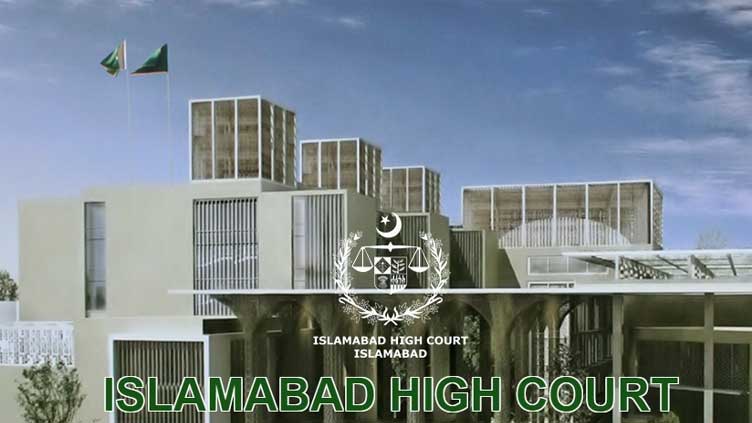
Justice Babar Sattar resumes hearing on petitions challenging alleged audio leaks
He added that other law enforcement agencies could take data from the ISI and IB if required.
The observation came as Justice Babar Sattar of the IHC resumed hearing on petitions challenging the alleged audio leaks involving former prime minister Imran Khan’s spouse Bushra Bibi, and Najam Saqib, the son of retired chief justice of Pakistan Saqib Nisar.
During the proceedings, Additional Attorney General Munawar Iqbal Duggal informed the court that the Interior Ministry had issued a certain SOP [standard operating procedure] mandating the Inter-Services Intelligence (ISI) and Intelligence Bureau (IB) to directly collect data from service providers.
He added that other law enforcement agencies could take data from the ISI and IB if required.
Justice Sattar noticed that the SOP in question had been issued by a section officer and there was no mention of the relevant authority.
He questioned how the Interior Ministry came to have this authority and under which law this SOP was issued.
He further questioned under what law the government decided it could access the data.
The judge then questioned the lawyer about phone tapping, adding that the legal standing of the document provided was yet to be examined.
In his response, the state lawyer, while referring to the missing persons’ case, stated that the Sindh High Court had issued orders for providing data to secret agencies.
At this, the judge inquired whether the Sindh High Court’s direction was limited to that case or was permanent.
When the judge asked the additional attorney general if he read the policy made [in this regard] in 2013 and whether data was collected as per the mechanism of this policy, the additional attorney general replied in the affirmative.
During the hearing, the judge inquired that on what basis the Pakistan Telecommunication Authority (PTA) was passing the direction.
The lawyer representing the PTA said that there was a case before the Sindh High Court, in connection of which all the parties, including PTA, were summoned and a mechanism was formed. That decision [of the Sindh High Court] did not get challenged and the 2013 policy was formulated [this way].
The court inquired of the lawyer if the PTA had not allowed anyone to tap phone calls.
At this, the lawyer said that the PTA had not given permission to anyone for phone tapping. “PTA is not doing any surveillance. PTA is the regulator.”
Appearing before the court, the lawyer for the Islamabad Police, Tahir Kazmi, stated that according to their understanding, there was no ban on taking this evidence.
Justice Sattar asked if the police could go to someone’s house without a warrant.
The lawyer replied that the neither the police did surveillance nor any recordings, adding that the police take the evidence after an incident.
When the judge asked if the police obtained a warrant in the past 11 years, the lawyer replied that according to their understanding, it was not necessary to get a warrant to take the evidence after an incident takes place.
The judge inquired, “If there is a private video recorded at home, how can it be admitted as evidence?”
The lawyer responded, “We do not conduct surveillance. We gather evidence after an incident for collection.”
Justice Sattar remarked, “Has Islamabad Police not understood until now why a warrant is necessary? Did you not need it in 11 years? Who told the IG not to take warrants? Was Parliament unintelligent to pass this law? In 11 years, not once did anyone take a warrant to collect data.”
The judge remarked, “If you have made a law, everyone should know. People should know how their privacy is being invaded. Courts here do not know what you are doing. This is not about national security. You cannot say whether a law exists or not.”
At this point, the additional attorney general asked the judge to hold hearing in the chambers and they would inform him about it.”
At this, the judge remarked, “Am I asking you or terrorists? I’m only asking about the law. Are you saying judges’ chambers or the Prime Minister’s House are tapping hostile agencies?”
The additional attorney general replied, “No, that’s not the case.”
Justice Sattar said that this was not a matter of national security. “I reject your request for a chamber hearing. We will not start joking about chamber hearings here.”
During the hearing, a request was made by the federal government to lift restrictions on giving data to telecom operators.
Justice Babar Sattar inquired, “Are there rules under the Telecommunications and Telegraph Act or not? How does taking a warrant pose a threat to national security? Pakistan is not the only country fighting terrorism; after 9/11, many countries in the world faced similar situations. Countries, including the United States, have enacted laws and formulated strategies. This is not rocket science; due to terrorism, you cannot say that questioning is unwarranted.”
Continuing his remarks, Justice Sattar remarked, “I am not asking you who the terrorists are, what their names are, or whether enemy agencies are involved. I have been asking this question for a year. Either annul my decisions from the Supreme Court, or you will have to answer here. Many positions have changed in the reports. The court could have taken action for forgery. Is this the conduct of the federal government? Or do you just say that you are above the law?”
“No one is above the law,” responded Additional Attorney General Duggal.
Taking the rostrum, the lawyer representing the telecom company, told the court that providing data to telecom operators was a condition of PTA’s license.
Justice Sattar asked, “Do you know about the data being collected?”
The lawyer replied, “No, telecom operators are not aware of this. They implement this system based on PTI’s instructions.”
The lawyer for the telecom company stated that authorised agencies can access two percent of the data of all telecom company users simultaneously.
Justice Sattar asked, “Are you collecting two percent of the data of all telecom company users nationwide? You incur expenses; how are you not responsible if you establish the system? There is no law permitting phone tapping; if no mechanism is provided, what is happening is illegal.”
The judge said that if telecom companies were providing citizens’ data without any scrutiny, they were equally responsible.
The judge stated that the PTA chairman and board members would receive contempt of court notices. “PTA told the court that they did not authorise any phone tapping. But telecom operators implemented the entire system based on PTI’s instructions.”
During the hearing, Islamabad Police’s lawyer, Tahir Kazmi, appeared in court and requested permission to provide a CD-R up to the limit of the investigation.
Justice Sattar remarked that he would issue appropriate orders in this regard.
Subsequently, the court adjourned the hearing indefinitely, stating that the date for the next hearing would be issued in a written order.


